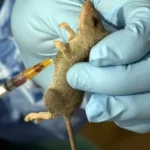A leading public health pharmacist and antimicrobial resistance (AMR) advocate, Pharm. Adeola Bakare, has raised alarm over the link between Nigeria’s growing waste crisis and the rise of drug-resistant infections. In an exclusive interview, she explained how poor waste management, particularly the improper disposal of antibiotics, is accelerating AMR across the country.
“Antimicrobial resistance happens when bacteria outsmart antibiotics, making infections harder to treat,” Pharm. Bakare explained. “Now, think about the waste piling up in Nigeria—open dumps in Aba, clogged gutters in Lagos. When expired antibiotics or hospital waste are dumped carelessly, those drugs seep into the environment. Bacteria in that mess get exposed to just enough antibiotics to adapt and resist. It’s like we’re training superbugs right in our backyards.”
The issue became even more pressing after the devastating 2022 floods that swept through states like Bayelsa and Kogi. These floods not only displaced thousands but also spread untreated waste into rivers and homes. “I’ve seen studies showing resistant bacteria in water near waste sites in Abuja,” Bakare added. “These bugs spread fast—through drinking water, crops, even flies. With over 60% of waste going uncollected, we’re setting ourselves up for a public health disaster.”
AMR is often linked to the misuse of antibiotics, such as people taking them unnecessarily for common colds. However, Pharm. Bakare warns that the waste crisis is adding another hidden layer to the problem. “Misuse starts resistance in your body; waste spreads it everywhere. After the floods, I visited a clinic in Yenagoa where patients had infections that wouldn’t respond to treatment, likely from contaminated water.”
With Nigeria’s population rising and Lagos alone generating 10,000 tons of waste daily—much of it uncollected—experts warn that AMR-related deaths could rise significantly. “The WHO warns AMR could kill millions by 2050,” Bakare cautioned. “Imagine a child in Kano dying from a simple cut because no antibiotic works—all linked to a nearby dump.”
Solutions: A Call to Action
Addressing the issue requires urgent reforms in drug disposal, waste management, and public education. Pharm. Bakare outlined key solutions which include Safe drug ddisposl, hospital waste management, public awareness and government action.
Pharm. Bakare emphasized the critical role of pharmacists in mitigating AMR. “We’re frontline warriors,” she said. “I’ve started a small project in Ibadan to collect unused drugs from homes and dispose of them safely. Pharmacists can refuse over-the-counter antibiotic sales, educate patients on completing prescriptions, and advocate for cleaner communities.”
She urged Nigerians to take responsibility, warning, “That cough syrup you dump today could breed a superbug tomorrow. Let’s dispose of medicines smartly, push for better waste management, and save lives. AMR is our fight—starting where we stand.”
With waste mismanagement and AMR posing an ever-growing threat, experts agree that urgent action is needed to prevent a future where even minor infections become deadly. The time to act is now.
WATCH TOP VIDEOS FROM NIGERIAN TRIBUNE TV
- Let’s Talk About SELF-AWARENESS
- Is Your Confidence Mistaken for Pride? Let’s talk about it
- Is Etiquette About Perfection…Or Just Not Being Rude?
- Top Psychologist Reveal 3 Signs You’re Struggling With Imposter Syndrome
- Do You Pick Up Work-Related Calls at Midnight or Never? Let’s Talk About Boundaries






